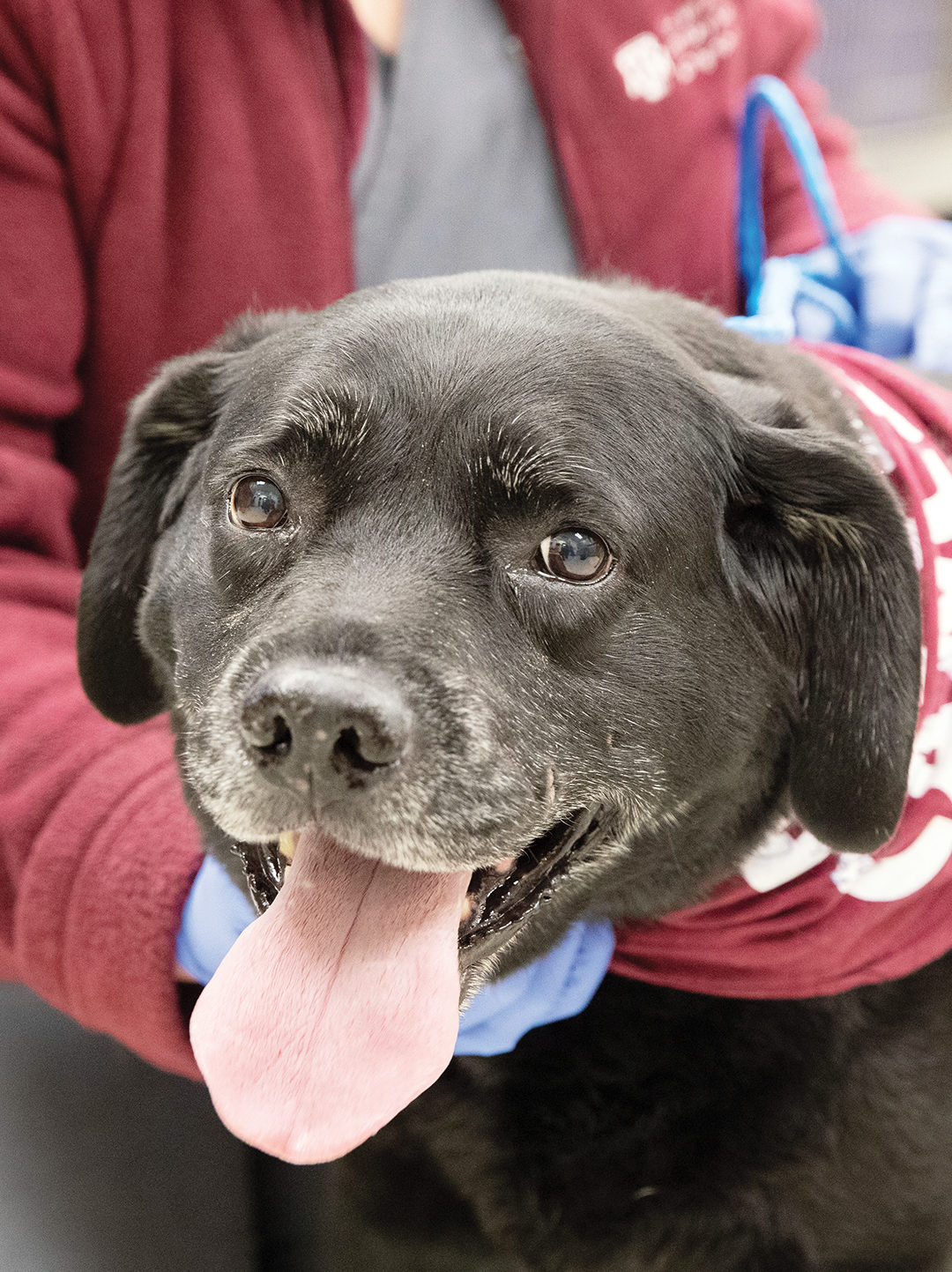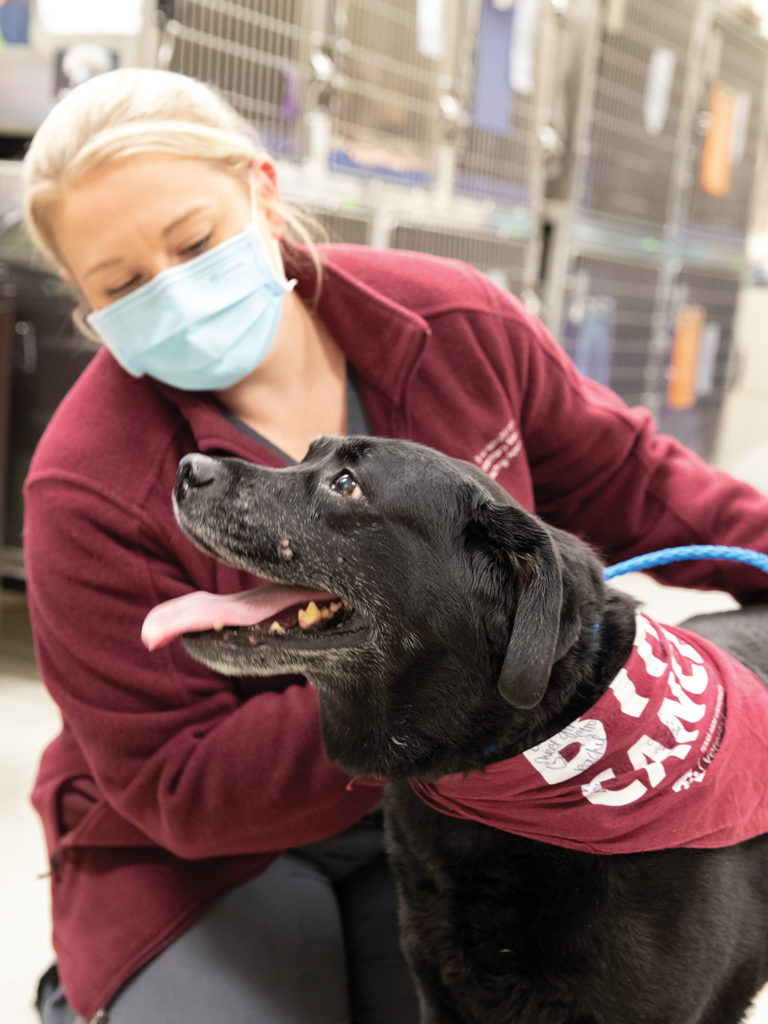Texas A&M VMTH, Gary Sinise Foundation Help Veteran’s Dog Beat Cancer
Story by Megan Myers, CVMBS Communications

“Lilly is more than just our dog. She’s more than just our family member. She’s changed my child’s life and made it so much better,” said Laura Deming, a physician’s assistant and Navy veteran from Houston.
Lilly, a 10-year-old black lab, joined the Deming family in 2011 as a trained assistance dog for Deming’s son, Beau, who has autism and a history of seizures.
“She makes sure he’s safe and keeps him calm when he’s nervous,” Deming said. “They’ve grown up together and she’s a good companion for him because he doesn’t speak very well. She just always stays with him and takes care of him.”
Lilly is almost constantly at Beau’s side. The only time she isn’t by his side is while Beau is at school, and Lilly can be found eagerly waiting at the school bus stop each afternoon. She’s even a member of Beau’s special needs cheerleading team and is assigned her own uniform so she can join the kids out on the floor.
Because Lilly is so much more than a pet to Beau, Deming was immediately concerned when she felt an odd tightness in Lilly’s chest in November 2019. Their local veterinarian didn’t think it was worth worrying over, but Deming decided to seek a second opinion.
“It just didn’t feel right to me,” she said. “A new vet opened up a practice in our town and since the first exam was free, I took her over. He immediately said, ‘This is not good.’”
The doctor diagnosed Lilly with a high-grade soft tissue sarcoma in her chest, a form of cancer that is common in dogs and, in Lilly’s case, was growing at a very rapid rate. He performed an initial surgery that same day to remove the bulk of the tumor and suggested Deming find a specialist to provide further treatment.
Although Deming had no history with Texas A&M, she recalled a friend telling her about the veterinary specialists at Texas A&M’s Veterinary Medical Teaching Hospital (VMTH) and decided to make the drive to the Small Animal Hospital (SAH) in College Station.
There, Lilly underwent a second surgery in January 2020 to remove the remaining sarcoma cells surrounding the site of the tumor, followed by six doses of chemotherapy, spread out over 18 weeks, to kill any remaining traces of the cancer.

In November 2020, a year after Lilly’s initial diagnosis, she was finally cancer free.
“She’s done really well and the fact that she’s made it to a year is a big milestone,” said Dr. Heather Wilson-Robles, the Dr. Fred A. and Vola N. Palmer Chair in Comparative Oncology at the Texas A&M College of Veterinary Medicine & Biomedical Sciences (CVMBS). “I think her prognosis is certainly trending in the right direction. At this point, each time we check her and she’s clean, it gets better and better.”
Thanks to the Gary Sinise Foundation Veterinary Valor Fund, the SAH was also able to cover a portion of Deming’s bill for Lilly’s care.
“One day I was wearing a Folds of Honor (an organization that provides scholarships to spouses and children of America’s fallen and disabled service members) shirt and someone at the hospital asked if I was in the military, and when I said, ‘yes,’ she said they would be able to help me, especially since Lilly is a service dog for a special needs child,” Deming said.
“We are so grateful,” she said. “I’m a single mother with two kids, one with special needs. I just can’t say how grateful we are that A&M is blessed enough to have the Sinise fund.”
Besides follow-up visits to the SAH every three months, Lilly’s life is back to normal and she is feeling great, according to Deming.
“Lilly is an amazing dog, so smart and so incredible,” Deming said. “She’s such a great service dog and a great help when it comes to caring for my son. It was really hard for him when she was gone for treatment, but all is good now and Lily is back to normal.”
“Lilly would not be here now taking care of my son if it wasn’t for A&M,” she said. “We can never be thankful enough for all of the help we got.”
The Gary Sinise Foundation Veterinary Valor Fund accepts donations online from other donors. For more information, please contact Larry Walker, Senior Director of Development for the College of Veterinary Medicine & Biomedical Sciences, at lwalker@txamfoundation.com or by phone at 979.845.9043. Give online at http://give.am/GarySiniseVetValor.
###
Note: This story originally appeared in the Spring 2021 edition of CVMBS Today.
For more information about the Texas A&M College of Veterinary Medicine & Biomedical Sciences, please visit our website at vetmed.tamu.edu or join us on Facebook, Instagram, and Twitter.
Contact Information: Jennifer Gauntt, Director of CVMBS Communications, Texas A&M College of Veterinary Medicine & Biomedical Sciences; jgauntt@cvm.tamu.edu; 979-862-4216


